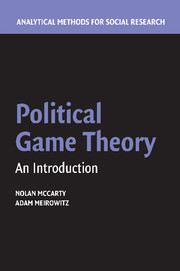Book contents
- Frontmatter
- Contents
- Acknowledgments
- 1 Introduction
- 2 The Theory of Choice
- 3 Choice Under Uncertainty
- 4 Social Choice Theory
- 5 Games in the Normal Form
- 6 Bayesian Games in the Normal Form
- 7 Extensive Form Games
- 8 Dynamic Games of Incomplete Information
- 9 Repeated Games
- 10 Bargaining Theory
- 11 Mechanism Design and Agency Theory
- 12 Mathematical Appendix
- Bibliography
- Index
12 - Mathematical Appendix
Published online by Cambridge University Press: 05 June 2012
- Frontmatter
- Contents
- Acknowledgments
- 1 Introduction
- 2 The Theory of Choice
- 3 Choice Under Uncertainty
- 4 Social Choice Theory
- 5 Games in the Normal Form
- 6 Bayesian Games in the Normal Form
- 7 Extensive Form Games
- 8 Dynamic Games of Incomplete Information
- 9 Repeated Games
- 10 Bargaining Theory
- 11 Mechanism Design and Agency Theory
- 12 Mathematical Appendix
- Bibliography
- Index
Summary
Mathematics is the study of axiomatic systems and the true propositions of these systems. Mathematics as a language facilitates communication about these systems and the resulting propositions. In comparison to ordinary language, mathematical statements tend to be more transparent, revealing how assumptions and conclusions are related. Mathematical propositions are true or correct if they follow from the structure of the system that generates them. For example, Euclidean geometry is the set of all statements that are true if parallel lines never intersect. So the statement that the shortest distance between points is a straight line is true in Euclidean geometry. The claim that the quickest way to get from Central Park to Princeton is a straight line may or not be true. The answer might depend on traffic between these two points, the quality of paving, or other factors. Thus, just as the extent to which a mathematically true proposition about distance accurately describes a problem we care about is unclear, mathematically correct propositions about game theoretic models may or may not accurately describe politics. Students and scholars interested in pursuing more about truth and the value of models and formalism should seek out epistemologists. From our perspective, a critical step is determining what the mathematically correct propositions are. In this appendix we first give explicit definitions to mathematical terminology. We then define the standard axioms of the mathematical system in which most, albeit not all, applications in political game theory are assumed to exist.
- Type
- Chapter
- Information
- Political Game TheoryAn Introduction, pp. 369 - 416Publisher: Cambridge University PressPrint publication year: 2007

